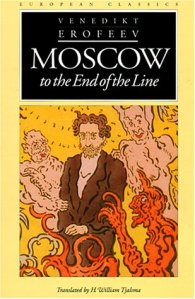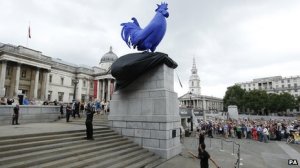Last spring I traveled to London. I drank coffee at Costas, saw the Blue Chicken at Trafalgar Square, broke my camera while photographing a Roman tiara at the British Museum, and purchased at least 20 books during frequent visits to Skoob, Foyles, and the London Review Bookshop.
The local newspaper reports that Midwestern tourists are annoyed at having bought expensive tickets to exotic places when the weather this spring is gorgeous right here. (I’m staying home.)
Nonetheless, I am recommending Spring Break reading for y’all. If you’re flying from O’Hare (and God help you if you are), your plane will be late or canceled or rescheduled and you will be there for five hours before you get on the f—g plane. When the stewardess offers you free drinks, a disgruntled passenger will shout, “Seriously? Just get us home.”
I hope you brought some books with you.
First up, Katie Fforde’s Love Letters.
 Do you love to laugh? Of course you do. Fforde writes high-end chick lit that borders on literary fiction. I chose this novel because the heroine, Laura Horsley, is a voracious reader who works at a bookstore. Unfortunately, this bookstore is about to close.
Do you love to laugh? Of course you do. Fforde writes high-end chick lit that borders on literary fiction. I chose this novel because the heroine, Laura Horsley, is a voracious reader who works at a bookstore. Unfortunately, this bookstore is about to close.
When barracuda agent Eleanora Huckleby shows up at a client’s reading at the bookstore, she is impressed by Laura’s critical knowledge of contemporary fiction and organizational skills: Laura organizes the readings. And so she manipulates Laura into helping organize a new literary/rock festival (something like Gloucester). Laura travels to Ireland to beg their favorite writer, Dermot, to give a reading at the festival. He tells her at the pub that he will go if she sleeps with him. Laura is so drunk that she agrees but falls asleep immediately Technically she has slept with him, but she can’t remember if they had sex. (They didn’t.)
To make this comedy even more delicious, Dermot is so smitten with Laura that he comes to England to teach a week-long writing course, and deviously arranges for her to be his assistant. He insists that Laura screen the manuscripts (most are dreadful and very few have a plot) and work as his assistant during the course
When Dermot asks her if she understands how much a PR glitch interferes with his creativity, the prim Laura suddenly says,
No, because, thank the Lord, I’m not a creative person. I’m just the little Jane Eyre character who makes it all possible for you pathetic, irritating, solipsistic, up-themselves “creative people”!
Go, Laura!
Second up, Venedikt Erofeev’s Moscow to the End of the Line.
 How do you feel about Russian satire? This short Russian classic, written in 1969 and published in Europe in the ’70s but not in the Soviet Union till 1989, is a hilarious-sad send-up of Russian life, literature, alcoholism, and the Kremlin. I love it so much that I intend to reread it shortly.
How do you feel about Russian satire? This short Russian classic, written in 1969 and published in Europe in the ’70s but not in the Soviet Union till 1989, is a hilarious-sad send-up of Russian life, literature, alcoholism, and the Kremlin. I love it so much that I intend to reread it shortly.
The hero-writer, who is coincidentally named Venedickt Erofeev, has been kicked out of his job as a foreman of cable fitters, beacause he spent his work hours drinking and graphing the employees’ drinking, and a colleague sent the graphs to headquarters. Disgraced and drunk, Venedickt takes a train journey from Moscow to Petushki: he says he wants to see his new lady-love and his sickly child
But he begins with the Kremlin.
Everyone says, ‘The Kremlin, the Kremlin.” I hear about it from everybody, but I’ve never seen it myself. How many times (thousands) I’ve walked, drunk or hung over, across Moscow from north to south, east to west, from one end to the other, one way or another, and never did I see the Kremlin.
The circular emphasis on the Kremlin in the first paragraph–it is named in the first and last sentence– anticipates the circular journey Venya is about to make from Moscow to Petuskhi and back to Moscow–and the Kremlin. With a suitcase full of liquor, he drinks heavily in the vestibule of the train and chats to other drunken passengers. They often mention Pushkin, Gogol, and Turgenev (one of his and my favorite Russian writers) and in fact the passengers decide to recreate Turgenev’s First Love, which begins with the characters taking turns turns recounting stories of their first love.
Venedikt makes some jokes about First Love.
Of course,” I added, “in Turgenev it’s a little bit different, in Turgenev, they all get together around the hearth, in top hats, holding jabots in outstretched hands. Oh well, OK, even without the hearth we’ve got something to warm up with. And what do we need with jabots? Even without the jabot we can’t see straight.”
By the way, on the train he also talks to angels and Satan..
The slangy, very readable, entertaining translation is by H. William Tjalsma (European Classics, Northwestern University) . I loved it. And I hope I’ll find something else by Erofeev at a used bookstore one of these days.


I *must* check if I have the Erofeev – it would fit so well with the kind of thing I’m reading just now!
LikeLike
He is definitely your kind of guy, and apparently there are a couple of different translations available!
LikeLiked by 1 person
Isn’t the transliteration from Russian to English a strange thing? I dug about in my Russians under E and found I had a book by Victor Erofeyev which I was confusing with this one. However, further rummaging revealed Moscow Stations by Venedikt Yerofeev from many years ago so I guess he was translated with a Y then. I knew this was familiar (and oddly enough my particular edition is priced at ridiculous amounts on Amazon – go figure! 🙂
LikeLike
Very confusing that Erofeev is Yeerofeyev! I have seen this difference in transliteration with names of characters in different translations of 19th-century classics, but never with the author’s name. We’re just going to have to break down and learn Russian. I see no other way. )
LikeLiked by 1 person
Would that I had the time and energy…. 🙂
LikeLike
🙂
LikeLike
Have never come across Erofeev – to be honest I’m not sure if I’ve read enough Russian novels to appreciate Russian satire, but it does sound rather fun! But I’ve read the Katie Fforde, and enjoyed it. Not great literature, but perefect holiday reading at any time of the year.
LikeLike
Christine, I think this novel is fun whether we know the Russian culture or not. He makes fun of the Kremlin, the govenment, and and on down to the authority figrues, and this book certainly is a good way to get recommendations for other Russian writers. I was reminded a bit of Gogol’s Dead Souls with the hero’s journey. I’d love to take a course in Soviet literature, but I’d have to drive 100 miles (and I don’t drive). If only we had a good liberal arts university in town…
Fforde is so much fun. I’m a decade behind on her books, but really enjoyed Love Leters, partly because I used to organize readings and literary conferences for a university. And then there’s the fact that I went to a writing conference one year. She really has it right: because she’s been on the writer side of them!
LikeLike